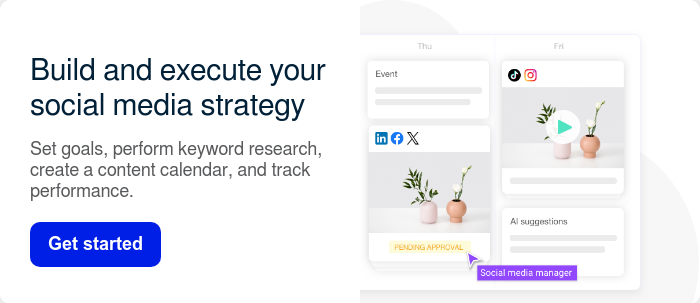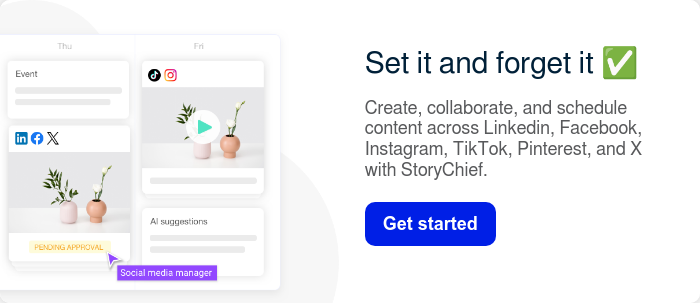Your clients are eager to ‘go viral’ on social media, and you're determined to deliver. However, you understand that simply churning out content isn't enough. To achieve outstanding results, it is essential to utilize the best social media management tools.
However, let's face it, achieving customer success on social media is no easy task. That's why we've got you covered with this comprehensive list of 20 social media management tools for digital marketing agencies, social media marketers and social media managers.
FYI: With StoryChief you can publish to all your social media accounts with 1 click, including Facebook, Linkedin, Instagram, Instagram Reels, TikTok, Pinterest, and many others. Give it a try for free! 🙌
20 Best Social Media Agency Tools
- StoryChief
- Hootsuite
- Buffer
- Sprout Social
- SocialBee
- Sendible
- Agorapulse
- SocialPilot
- CoSchedule
- Later
- MeetEdgar
- Loomly
- Falcon.io
- eClincher
- ContentCal
- Kontentino
- Mavsocial
- Buzzsumo
- Visme
- Post Planner
20 Social Media Management Tools
1. StoryChief - All-in-one Content Marketing Platform
StoryChief takes the top spot on our list for several reasons. This comprehensive content marketing platform and social media management platform simplifies the content creation and content distribution process.
It allows agencies to collaborate seamlessly, manage multiple social media accounts, and analyze performance, all from a single dashboard. With StoryChief, you can streamline your content strategy and increase efficiency, making it an invaluable asset for agencies in 2024.

Best features:
- Real-time collaboration simplifies teamwork for distributed teams.
- Campaign management helps plan and track campaigns across platforms.
- Multi-channel publishing supports content distribution to WordPress, Medium, Blogger, etc.
- SEO and readability tools offer real-time optimization tips for better performance.
- Integrates with over 1,000 tools like CMS platforms, social media, email marketing services, and CRMs.
- Expanded support for TikTok, Pinterest, and Instagram Reels.
- Workflow automation reduces manual tasks and boosts efficiency.
- Provides insights into engagement and campaign performance on websites and social media.
- Automatic formatting ensures content looks great on any device.
Cons:
- The platform can be overwhelming for new users due to its comprehensive features.
- Some restrictions on template and workflow customization may hinder specific use cases.
2. Hootsuite
Hootsuite remains a stalwart in the social media management arena. With its user-friendly interface and robust scheduling capabilities, it enables agencies to plan, publish, and analyze social media content across various platforms.
Hootsuite also offers social listening and analytics tools, making it a well-rounded choice for agencies seeking comprehensive solutions.

Pros:
- Supports a wide range of social networks.
- Robust scheduling and publishing capabilities.
- Social listening and analytics tools.
Cons:
- Basic reporting features.
- Complex interface for beginners.
- Limited engagement features compared to specialized tools.
3. Buffer
Buffer is a versatile social media management tool trusted by agencies worldwide. It allows for easy content scheduling, engagement tracking, and in-depth analytics. Buffer's clean and intuitive design simplifies the social media management process, making it a go-to choice for agencies aiming for efficiency and effectiveness.

Pros:
- Clean and intuitive design.
- Robust scheduling capabilities.
- In-depth analytics for performance tracking.
Cons:
- Limited social listening and engagement capabilities.
- Less comprehensive reporting compared to some competitors.
4. Sprout Social
Sprout Social offers a powerful suite of social media management and analytics tools designed to enhance agency performance. It facilitates content scheduling, social monitoring, and in-depth reporting, all while providing valuable insights into audience behavior. Agencies can make data-driven decisions and optimize their social media strategies with Sprout Social.

Pros:
- A comprehensive suite of social media management and analytics tools.
- Audience behavior insights for targeted content.
- User-friendly interface.
- Offers social media listening tools.
Cons:
- Learning curve for utilizing all features effectively.
- Limited support for some niche social networks.
- Basic content planning features.
5. SocialBee
SocialBee stands out for its exceptional content categorization and scheduling features. It allows agencies to organize content effectively, target specific audience segments, and automate posting. This tool's unique capabilities make it a valuable asset for agencies looking to optimize their content strategy.

Pros:
- Excellent content categorization and scheduling.
- Targeted audience segmentation.
- Efficient content automation.
Cons:
- Limited in-depth analytics.
- Lack of social listening capabilities.
- Learning curve for utilizing advanced features.
- Reporting features could be more robust.
6. Sendible
Sendible is a versatile social media management platform tailored to the needs of agencies. It offers scheduling, monitoring, and reporting features along with white-label options, making it a great choice for agencies aiming to provide branded social media services to clients.

Pros:
- Suitable for managing multiple client accounts.
- Collaboration features for team coordination.
Cons:
- Limited in-depth audience insights compared to some competitors.
- Some users find the interface less intuitive for advanced features.
- Some users may prefer more in-depth analytics.
7. Agorapulse
Agorapulse simplifies social media management with its intuitive interface and comprehensive suite of tools. It provides scheduling, monitoring, and reporting features, as well as team collaboration options, making it an ideal choice for agencies working on collaborative projects.

Pros:
- User-friendly interface.
- Team collaboration options.
- In-depth reporting and analytics.
Cons:
- Content suggestion and curation tools could be enhanced.
- Advanced automation options may not be as extensive as specialized tools.
- Limited integrations compared to some competitors.
8. SocialPilot
SocialPilot is another valuable addition to our list, offering content scheduling, analytics, and team collaboration features. It also allows agencies to manage client accounts effectively.

Pros:
- Efficiently manages multiple client accounts.
- Affordable pricing options.
- User-friendly interface.
Cons:
- Limited social listening capabilities.
- Reporting options could be more comprehensive.
- May not suit agencies with complex content approval workflows.
9. CoSchedule
CoSchedule is not just a social media management tool but also an all-in-one marketing calendar and content marketing platform. It enables agencies to plan, execute, and analyze their entire marketing strategy, making it a comprehensive choice for agencies with diverse marketing needs.

Pros:
- Comprehensive marketing calendar.
- All-in-one content marketing platform.
- Efficiently plans and executes marketing strategies.
Cons:
- Advanced social listening features are limited.
- May not offer in-depth competitor analysis.
- Learning curve for utilizing all features effectively.
- Integration options could be more extensive.
10. Later
Later is a popular Instagram-focused social media management tool. It simplifies Instagram scheduling, provides visual content planning, and offers analytics specific to the platform. Agencies looking to make the most of Instagram should consider Later as part of their toolkit.

Pros:
- Specializes in Instagram management.
- Visual content planning.
- Instagram analytics.
Cons:
- Limited support for other social platforms.
- May not suit agencies with diverse client needs.
- Content approval workflows are less developed.
11. MeetEdgar
MeetEdgar is a social media automation tool that focuses on recycling content. It helps agencies get more mileage out of their evergreen content by automatically reposting it at strategic intervals, reducing the need for constant content creation.

Pros:
- Automates content recycling.
- Time-saving for constant content creation.
- User-friendly interface.
Cons:
- Limited social media platform support.
- Social listening features are limited.
- Content approval workflows are limited.
12. Loomly
Loomly is a user-friendly social media management tool designed for collaboration. It streamlines content creation, approval workflows, and scheduling, making it an excellent choice for agencies with multiple team members and clients.

Pros:
- Strong focus on collaboration.
- Simplifies content workflows.
- User-friendly content calendar.
Cons:
- Social listening capabilities are relatively basic.
- Advanced analytics and reporting may be lacking.
- Collaboration and content approval features could be enhanced.
13. Falcon
Falcon.io offers a unified social media management and customer experience platform. It includes features like social listening, publishing, and customer engagement, making it an excellent choice for agencies looking to provide a holistic social media solution to clients.

Pros:
- Unified social media management and customer experience platform.
- Ideal for holistic social solutions.
- Offers social listening.
Cons:
- Pricing may be on the higher side.
- Some users may find the interface complex.
- Limited support for some emerging social platforms.
- May not offer in-depth competitor analysis tools.
- Content optimization recommendations may be less robust.
14. eClincher
eClincher is an all-in-one social media management tool that combines scheduling, publishing, monitoring, and reporting. It also offers integrations with various platforms, streamlining the management of multiple social media accounts.

Pros:
- Combines scheduling, monitoring, and reporting.
- Integrates with various platforms.
- Suitable for managing multiple social accounts.
Cons:
- Advanced analytics and reporting may be lacking.
- Content approval workflows could be more robust.
15. ContentCal
ContentCal is a content planning and social media scheduling tool that focuses on collaboration and workflow management. It's ideal for agencies that want to improve team coordination while maintaining an organized content calendar.

Pros:
- Focuses on collaboration and workflow management.
- Enhances team coordination.
- Organizes content effectively.
Cons:
- Limited support for some social platforms.
- May not suit agencies with extensive reporting needs.
16. Kontentino

Kontentino is a social media management and collaboration tool designed for marketing teams and agencies. It helps streamline the content approval process, schedule posts, and manage multiple social media accounts from a single dashboard.
Pros:
- It offers a user-friendly content calendar for scheduling and visualizing social media posts.
- Ideal for agencies, it allows clients to review and approve content, fostering collaboration.
Cons:
- May not support as wide a range of social networks as some competitors.
- Limited social listening and engagement capabilities.
- Advanced analytics and reporting may be lacking.
17. MavSocial

Mavsocial is a social media management and publishing platform that focuses on content creation, scheduling, and social media advertising.
Pros:
- Provides an efficient scheduler for planning posts across various platforms.
- Includes social listening tools to monitor brand mentions and relevant conversations.
- Allows for the creation and management of social media ad campaigns.
Cons:
- Some users may find the interface complex and require time to learn.
- Collaboration features for teams and clients may not be as robust as other tools.
- It may not offer as many integrations with other marketing tools.
18. BuzzSumo

Buzzsumo is a content discovery and social listening tool that helps users find trending content, track brand mentions, and analyze competitor performance.
Pros:
- Easily discover trending and popular content in your niche.
- Analyze competitor content and performance to gain insights.
- Identify key influencers in your industry.
Cons:
- The tool is costly and requires significant effort to achieve the desired outcomes.
- Some users find that social media monitoring tools are not reliable in terms of accuracy.
- Occasionally, the mentions you receive come from low-quality websites.
19. Visme

Visme is a visual content creation platform that allows users to design infographics, presentations, and other visual content for social media and marketing purposes.
Pros:
- Simplifies the creation of eye-catching visual content, even for non-designers. Specializes in infographic creation, which can be highly shareable on social media.
- Allows teams to collaborate on design projects.
Cons:
- Visme is primarily a content-creation tool and lacks the social media management features of other platforms.
- Integration with social media platforms is limited compared to dedicated social media management tools.
20. Post Planner

Post Planner is a social media scheduling and content curation platform that helps users find and plan engaging content for social media.
Pros:
- Makes it easy to find and curate engaging content from various sources.
- Provides scheduling tools for social media posts.
- Offers basic analytics to measure post-performance.
- Helps users plan and visualize their social media content schedule.
Cons:
- May not support as many social platforms compared to other tools.
- Analytics features may be limited for in-depth analysis.
- Collaboration features for teams may not be as extensive as other platforms.
Common challenges faced by marketing agencies
Marketing agencies encounter various obstacles when it comes to effectively serving their clients. These challenges can have a significant impact on an agency's ability to provide top-notch service.
The most common struggles include:
- Communication and approvals
- Too many tools
- Cost and scaling
“In any tool we choose, three functionalities are non-negotiable: seamless integration with other platforms, in-depth analytics, and the ability to scale with our growth. These functionalities enable us to be agile, data-centric, and growth-oriented.”- Marshal Davis, President at Ascendly Marketing
Let's take a closer look at these common issues and explore how social media management tools can help agencies overcome them and reach their business goals.
1. Inefficient communication and slow approvals
Effective communication is essential for a successful client-agency relationship. In the fast-paced world of social media marketing, time is of the essence, and slow approvals can become major roadblocks for agencies.
To address these challenges, agencies need to establish efficient content workflows. Social media management tools play a crucial role in this regard by providing features that facilitate collaborative approvals, feedback collection, and project tracking. Much like StoryChief does.
Join 5,000 marketing professionals and teams who already save multiple hours every week on content creation, collaboration, and distribution. Create a free account and start publishing today. 🙌
2. Too many tools
Managing multiple disconnected tools and platforms can be a major headache for marketing agencies. When you have to use different tools for content creation, scheduling, monitoring, and reporting, it can lead to inefficiency. Not only does it take time to switch between these platforms, but it also increases the chances of making errors.
To address this challenge, agencies should consider using all-in-one social media management tools. These platforms bring together various functions, saving time and cutting costs.
3. Cost and scaling
Scaling an agency presents unique challenges as it involves maintaining quality, consistency, and client satisfaction while taking on more clients and projects.
To navigate the scaling process successfully, agencies must prioritize resource allocation, streamline workflows, and ensure that high-quality content remains a top priority.
Social media management tools can aid in this endeavor by providing features that enhance efficiency, collaboration, and client management without compromising on quality.
Features to look for in social media agency tools
Are you looking for a tool to streamline your social media workflow? Here are 4 key features that every top-notch social media management tool should have:
1. Content collaboration
Communication is key, especially when it comes to managing social media accounts for clients. That's why the best tools offer content collaboration features, allowing you and your clients to work together effortlessly and stay on the same page. The top-notch tools even provide options for inviting external teams to review content, without requiring them to create an account on the platform.
2. Multiple workspaces
Juggling multiple clients? A great social media management tool should provide the flexibility of creating separate workspaces for different clients or campaigns. This way, you can keep everything organized and easily switch between projects without any hassle.
3. Social media analytics and reporting
To measure the success of your social media efforts, you need access to comprehensive social media insights and social media performance. Look for a tool that provides in-depth real-time analytics on content performance engagement metrics, audience demographics, and performance trends.
Additionally, a tool that provides the ability to add UTM tracking to social posts is a must if you want to track and attribute traffic from social media. UTM tracking is one of StoryChief’s stand-out social media management features.
“One functionality that is often lacking in many social media tools is the ability to easily track and attribute website traffic generated from social media posts. This feature would provide agencies with valuable insights into the effectiveness of their social media efforts and a way to demonstrate the ROI for their clients.” - Michael Giannulis, owner at CopyMachines
4. Automation and integrations
Integrations help you to automate your marketing efforts as well as publishing content to multiple channels at once. The best social media management tools should be able to integrate with other software such as CRM systems or email marketing platforms. This will help you get the most out of your existing tools whilst also making it easier to manage all your data in one place.
“When it comes to social media agency tools, email marketing integration ranks pretty high on our list of must-haves. This is especially true whenever we nail a killer social media campaign and want to keep that momentum going by reaching out to potential leads via email. ” - David Godlewski, CEO at Intelliverse
Managing clients with social media agency tools
With StoryChief, you can automate and manage every aspect of content marketing: briefing, assigning, writing, SEO and readability optimization, reviewing, approving, and publishing. Try it free.
More resources:











